- Home
- Linda Byler
Hester on the Run Page 24
Hester on the Run Read online
Page 24
In spite of her many unanswered questions, she did have the leather-bound book of Indian wisdom. It would remain with her wherever she ended up.
She had convinced herself that it was right to leave the Amish people. This thought had been brought about by Annie’s hatred, but now, as she bowed to Annie’s will, she wondered if everyone in the tribe of Lenape was kind. Wouldn’t there be unkind ones among them? Certainly. They were part of the human race. She began to wonder if leaving one group of people for another might not give her the answer she hoped for.
She was surrounded by mountains, great hills, and valleys, an endless schoolroom containing a vast store of knowledge.
She knew which birds migrated south and when. She knew where the mother fox hid her kit. She had found all the plants and trees and roots mentioned in the book, easily identifying them. She watched the bald eagles build their nests and knew where the spotted fawns were hidden. She could tell by the swallow’s flight when a storm was approaching. The beavers’ houses told her how harsh the winter would be, as did the thickness of the acorns scattered on the floor of the forest. The jay’s screaming heralded the approach of another animal or human being.
She was an expert marksman with the handmade slingshot she’d fashioned while still in school. She supplied the household with rabbits and squirrels and an occasional pheasant. Many deer had fallen when one of Hester’s arrows lodged in precisely the right spot, bringing them down with a minimum of suffering.
She always thanked God for giving her meat for her family, then dragged the deer to the side of the barn, where Hans or Noah or Isaac would fa-sark it. It was an unspoken secret, for nothing inflamed Annie’s seething temper like the thought of Hester’s hunting or Hans admiring her skills. Annie never knew who killed the wild animals.
Theodore and Lissie’s wedding was held at Hans Zug’s because his and Annie’s stone house was the largest in the community. Annie and Hester had scrubbed and washed, painted and toiled, until the place was perfectly groomed and shining. Already, the additional five acres had been half cleared, with the stumps burned.
Because it was springtime, many families offered a chicken for making roasht. There were plenty of turnips, and even some celery and cabbage. They added fresh greens with hot bacon dressing. The women made schnitz dried apple pies instead of the traditional pumpkin that was made during the fall of the year when most Amish weddings were held.
The wedding guests were duly impressed by Hans Zug’s fine farm, his wealth, his hardworking children. Strapping sons, they said. What a fine child, that Lissie!
Tongues clucked over the Indian girl. What a pity. The prettiest girl many of them had ever seen, but her eyes contained a pool of unnamed sadness in their black depths. What would ever become of her?
Theodore and Lissie, however, eclipsed every guest’s happiness, their joy shining visibly through their otherwise reserved demeanor, which was fitting and proper for a sober Amish wedding. They stood side by side, their hands placed in the bishop’s as he pronounced them man and wife.
Sadie Fisher told Mamie Troyer that Lissie was twice as wide as her husband, but Mamie frowned at Sadie’s remark, ruining the festivities for Sadie entirely.
Well, Mamie thought Sadie was making fun of Lissie, and everyone knew Sadie prided herself by maintaining her trim figure, which wasn’t right in the sight of God, or at least, in Mamie’s.
They ate vast quantities of hinkle dunkus, that good, rich, salty gravy that was ladled generously over the roasht.
Lissie leaned over and told Theodore that her own bacon dressing was better, although she wanted to remain appreciative. Theodore smiled at his radiant bride, agreed wholeheartedly, and thought himself the most fortunate man on earth. To think of having a good hot breakfast, with the scalding coffee she drank every morning, was a luxury he could not begin to imagine. The long cold nights spent shivering in his bed would be a thing of the past, as well as eating burned toast and poorly cooked eggs with the mice, that pestilence that dogged every day of his life.
The warm touch of his beloved Lissie had already taken up a place of wonder in his heart. The pure enjoyment of being in her company, the way she touched his arm, his shoulder, his cheek, the way she cooked his supper, he wondered why he’d waited so long.
Lissie’s smile faded and then melted away when she caught sight of Hester standing off by herself, dressed in the traditional blue wedding dress, a black apron around her slender waist. She was indeed, by far, the most beautiful person in the room. The most tragic as well.
Lissie pursed her lips, laid a hand on Theodore’s leg, leaned into his shoulder and jutted her chin in Hester’s direction. “Look.”
Theodore followed Lissie’s gaze. His eyes found Hester. “What?” he asked, unsure of what she meant.
“She’s so alone. Couldn’t we find a young man for her on this, our wedding day? Wouldn’t it be perfect?”
Theodore nodded. “But they do not pair the young people at a small wedding like ours, do they?” he whispered.
“No, you’re right.”
They watched as the young men filed in, observing carefully the way they behaved as they sat across the table from Hester. They all watched her discreetly, as she kept her eyes lowered to the German hymnbook placed on the table in front of her. Her lips moved along with the singing, but not once did she look up or as much as lift her face an inch.
At the next table sat her brother Noah, a blond giant of a boy, his face darkened by the early spring sun. His shoulders pushed at the white fabric of his shirt; his black vest fit seamlessly. His hair was cut shorter than the suitable ordnung for young men.
Some said Noah was “turning wild.” Some said he’d spoken of joining the lumber men, those crews of rough men without scruples who felled trees as fast as they could, hacking away at the forest with nothing in mind but making as much money as they could.
Noah had the most unusual eyes. They were not quite blue or green. Hans had dark brown eyes. His mother Kate’s eyes had been an astounding shade of blue.
Lissie watched, her eyes narrowed. Not once did Noah acknowledge his sister’s presence. He spoke to the young men beside him, smiling and laughing, but Hester may as well have been invisible for all he cared.
Yes, Hester may as well disappear for all that family cared about her, and it was all Annie’s doing. All of it. For the rest of her life, Lissie would remember her perfect wedding day, filled with love and anticipation, containing only one gray cloud named Hester.
Poor, darling Indian foundling. Surely God had a purpose.
CHAPTER 23
ANNIE’S HANDS WORSENED CONSIDERABLY. SHE could no longer lift the heavy crockery without using both hands. She hid this fact from Hester’s eyes repeatedly, covering one hand with her apron whenever Hester was in the kitchen.
One summer day when the heat and humidity had lifted, mercifully cooling the damp earth, Annie was in a better state of mind. She allowed Hester the luxury of ironing instead of hoeing corn, which she had done every other day of the week from sunup to sundown. Calluses formed on her hands where the dreaded blisters had been, which eased the pain and made the hoeing bearable, in spite of the fiery sun beating down on her head.
All girls strove to keep a pearly white complexion, devoutly wearing a straw hat to work in the garden. Annie required that Hester wear a hat as well, although she reminded her many times there was no use trying to keep her white since she never was and never would be. But it was the ordnung of the church, and no child of hers would be seen in her garden without a hat.
The minute Hester entered the back field, she untied the hated straw hat and flung it to the ground. All day, till she heard the dinner bell, she hoed, listening to the bird calls around her, identifying each one, as her hoe rose and fell and sweat trickled off her forehead and down her back.
Today, she cleaned up after the noon meal, washing all the dried food off the plates and forks while moving as quickly as she could. Annie watc
hed with narrowed eyes as she quietly dried the many dishes and put them all back in their places.
Turning, Annie lifted a heavy crockery pitcher, gasped, then screamed shrilly, as the pitcher crashed to the oak floor, a wide pool of milk spreading across its gleaming surface. Instantly, it was all Hester’s fault, but she had expected that and didn’t reply. Bending, she lifted the broken pieces, went to the pantry for a rag, and began to clean up the milk. Annie turned away, her tirade finished, satisfied that Hester had taken the blame.
Little Emma voiced her opinion with Barbara’s support, whereupon they were both paddled firmly and told to sit on the bench until they were sorry for their grosfeelich (proud and cocky) ways.
When Annie became agitated, her hands were always worse, causing her to clench them together, her fingers interwoven, her shoulders held erect.
Suddenly, Hester stood, having cleaned up all the milk and holding the bucket of soapy water she had used. “Annie, I believe I know a solution that would help your hands,” she said firmly.
Annie snorted. “Out of that devilish book, I suppose.”
Hester did not answer but simply took the bucket to the back porch and flung the water over the steps. Immediately, a bevy of geese came waddling, their necks outstretched, lifting their wings in warning.
“Can I mix a few herbs and steep them in boiling water?”
“No. You’ll kill me with that witchcraft.”
“It’s not to drink. It’s to soak your hands in twice a day.”
Annie scowled, and the vertical furrows on her forehead deepened as her narrow face took on a look of undisguised suspicion. She pursed her lips, smacked them with an unappetizing sound, turned away, and said, “No.”
“Please.”
“What kind of herbs?”
“Sage and mustard seed.”
“We don’t grow either of them.”
“I know where the wild plants are.”
Suspicion was replaced with hope, but then pride cast its shadow across her face, and she turned away. “No. And don’t mention it again.”
Hester returned to her ironing until the basket was empty, with the ironed garments hanging from the back of a chair. She folded the rows of white shirts and then put them in the wardrobe for Sunday’s use. She sewed missing buttons on knee breeches and searched all the everyday work breeches for holes and patched them.
Annie ran a terribly efficient house, every hour of every day producing something worthwhile. She had no use for any person who shirked a distasteful duty, all heavy people who ate more than was necessary, and anyone who spent a penny without considering the true necessity of the purchase. Hester knew she was too frugal to visit the doctor in Berksville, so she decided to bide her time, to let the matter drop for now.
Hans found Annie watching Hester with a wary eye. There was a difference in the way she looked at her, with a hesitation of sorts. For one hopeful moment, Hans wondered if Annie was indeed changing her opinion of Hester before he discarded the thought as foolish. He knew his wife’s ways all too well. She did not budge once she formed an opinion.
What did the scriptures say? Ah, but it was unthinkable. As he watched Annie hide the shaking of her hands with her apron more than once, he brought a fresh resolve to be more patient, more understanding of her tense moments with Hester.
Annie sent Hester to bring Noah and Isaac for the evening meal. Unsure about the borders of their property, she asked Hans where they might be.
“You’ll know. You’ll hear their axes.”
Annie asked loudly how she could traipse all over God’s creation and not know where the property line was.
“I know where the east and west borders are. I’m just not sure of the north.”
“You’ll find them.”
It seemed odd to Hester that anyone would be sent to fetch the older boys. Didn’t they always come in when dusk ushered them home? No one seemed particularly worried about their absence or their return. She decided to use extreme caution and keep her eyes and ears open. Annie had proved to be as untrustworthy as a wolf or a cornered rat, although neither of those descriptions suited her really. Hester knew she was more cunning than either one.
Walking through the cornfield, she entered the woods, staying on a straight course to the north. The land sloped uphill gently, then abruptly changed to a steep incline at the top. Undecided, Hester stayed still, evaluating the terrain. Yes, she’d been here many times. She’d always imagined the property line would be the top of the incline, along the crest of the hilltop.
She heard the ringing sound of an axe meeting solidly with wood. Clunk. Clunk. Clunk. A steady rhythm, faster than Hester thought possible, and then a cracking, ripping sound, a moment’s breath, a fearsome sound of branches breaking and cracking. A giant oak disappeared from view, coming to rest in a newly created clearing.
Noah stood hatless, his blond hair stuck to his head by the perspiration that soaked his body. One hand was coiled loosely around the heavy, wooden handle of the axe; the other rested low on his hip as he watched the tree’s descent. His feet apart, his strong legs made him appear a ruthless giant, taking control of every tree’s demise, destroying the pristine forest as if he were God himself.
Hester felt an inexplicable sadness, a tender pity for the great tree that stood so proud, its green leaves shading the forest floor, providing homes for woodland creatures. How could Noah spend his days whacking through the forest, cutting the beautiful trees without a thought in his head? Hester visualized the bald mountains and ridges littered with dead growth, the good, rich soil washed off the hillsides by torrential rains, the creatures of the trees having no home.
The old woman had informed her about the way of the Lenape. To fell a tree was unthinkable. Wrong. The Creator had placed trees on the earth for shelter and protection, and they should not be disturbed. They were sacred.
Suddenly, a rage so violent it was physical lent wings to her feet. Silently, she moved, swiftly hurrying down the incline, sliding, grabbing small trees, making only a minimum of sound. Noah looked up at her approach, his face masked. When he saw the agitation on her face, he stepped back, watching her uneasily.
On she came, her chest heaving, her fists balled tightly by her flowing green skirts, her black eyes flat with displeasure. She strode up to Noah, raised both hands, and thumped her fists against his wide, solid chest.
He stepped back, catching her hands, but so powerful was her dislike of him, she wrenched them free, delivering another blow to his upper arm. “Hey! What is wrong?”
In answer, she flung her head back, her black eyes snapping her anger. “I guess you’re happy to spend your days ruining the sacred forest!” She spat her words.
Isaac stopped, watching his sister intently.
“Oh, come on, Hester,” Noah said, grinning.
In answer, she reached up and smacked his face, hard. “Don’t you make fun of me! You mark my words. The time will come when you’ll regret this. All of you will.”
“Stop acting like an Indian. We are only obeying our father’s wishes. We need the land.”
Hester raised herself to her full height, her black eyes conveying her contempt. “Believe me, the time will come when the white people will need the land more than they do now.”
There was nothing to say to this, so Noah looked off across the woods where the tree lay in his path.
“Annie says supper is ready.”
Instantly, Noah loosened his grip on the axe, letting it fall to the ground. Then Isaac led the way up the slope, their heavy boots crashing through the undergrowth. Hester followed soundlessly, a few steps behind her brothers.
At the evening meal, Hans watched his two oldest sons with new respect, seeing the way they stayed silent, shoveled the hot food into their mouths, thanked Annie, and left the table immediately after the second prayer was said in silence.
Hester ate very little. She kept her head lowered except when she helped Barbara with her meat or spread
butter on a biscuit for Emma. Hans sensed agitation and wondered what had occurred, if anything.
A new thought snaked its way into Hans’s mind. Had the boys behaved unseemly toward Hester? A great and palpable fear entered his heart. He had no clue how he could ever approach these grown boys with his fear, his suspicion. It was unthinkable.
He could not talk to them of his feelings on any subject, so how could he approach them about Hester? He would need to be her guard. Every waking moment of every day, he would need to look out for her.
The thought placed a crushing responsibility on him, so he shared it with his wife, who watched her husband’s face go from red to white and back again as he spoke of his concern about the boys growing into men, perhaps thinking of Hester in ways other than merely being their sister.
Annie listened gamely, choosing to keep her face averted, unable to meet her husband’s too-bright eyes. Yes, she agreed, it was a reasonable concern, but she was certain the boys would not think of her as anything other than an Indian and want nothing to do with her.
“Unlike you, Hans,” she added.
For Annie was shrewd and watchful, her skill at deciphering looks and attitudes honed by her years of surviving a family that had hardly been better than a battlefield of wills.
Hester would have to go. How to go about that was a challenge she had not figured out, at least until now. No matter how she was treated, Hester became more of a servant. Annie would need to figure out another way.
These thoughts were all hidden as she watched the display of emotion on her husband’s face. Her husband. Hans. The Hans who did not love her.
Well, the rejection, the denial, could operate both ways. With her lips compressed into a thin line, her eyes doe-like, her head nodding in agreement, her will given to her husband, Annie plotted a plan that would not fail.
The trees continued to fall. Black smoke poured from the stumps that were removed. The boys had lit them on fire, and they were so thick and heavy that they burned endlessly.

 A Second Chance
A Second Chance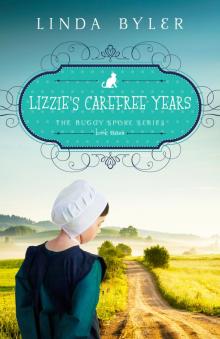 Lizzie's Carefree Years
Lizzie's Carefree Years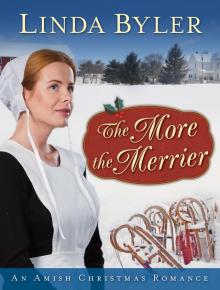 The More the Merrier
The More the Merrier Love in Unlikely Places
Love in Unlikely Places Running Around (and Such)
Running Around (and Such) Wild Horses
Wild Horses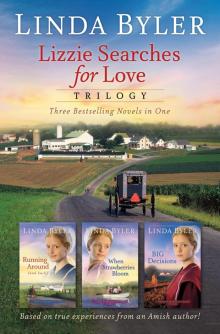 Lizzie Searches for Love Trilogy
Lizzie Searches for Love Trilogy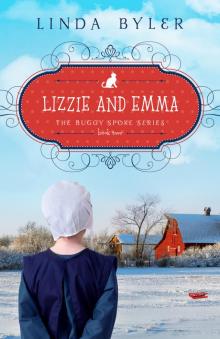 Lizzie and Emma
Lizzie and Emma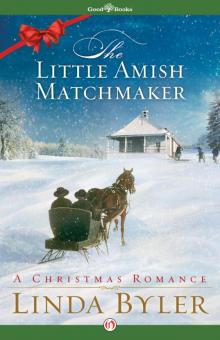 Little Amish Matchmaker
Little Amish Matchmaker The Witnesses
The Witnesses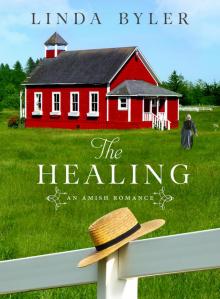 The Healing
The Healing Home Is Where the Heart Is
Home Is Where the Heart Is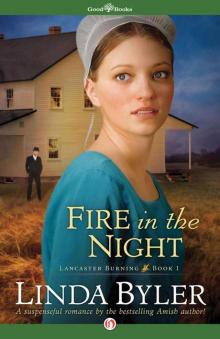 Fire in the Night
Fire in the Night When Strawberries Bloom
When Strawberries Bloom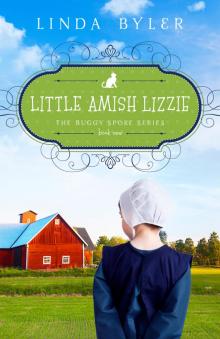 Little Amish Lizzie
Little Amish Lizzie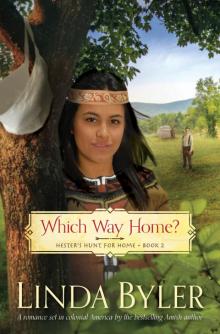 Which Way Home?
Which Way Home? The Homestead
The Homestead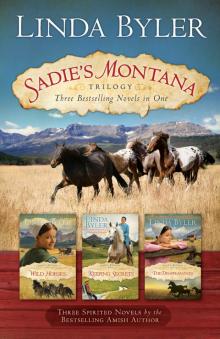 Sadie’s Montana Trilogy
Sadie’s Montana Trilogy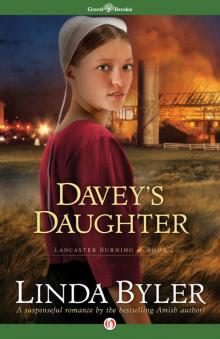 Davey's Daughter
Davey's Daughter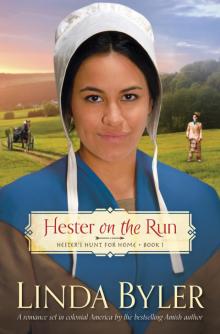 Hester on the Run
Hester on the Run Disappearances
Disappearances Big Decisions
Big Decisions Becky Meets Her Match
Becky Meets Her Match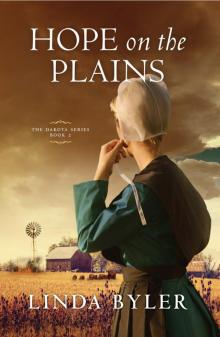 Hope on the Plains
Hope on the Plains Christmas Visitor
Christmas Visitor